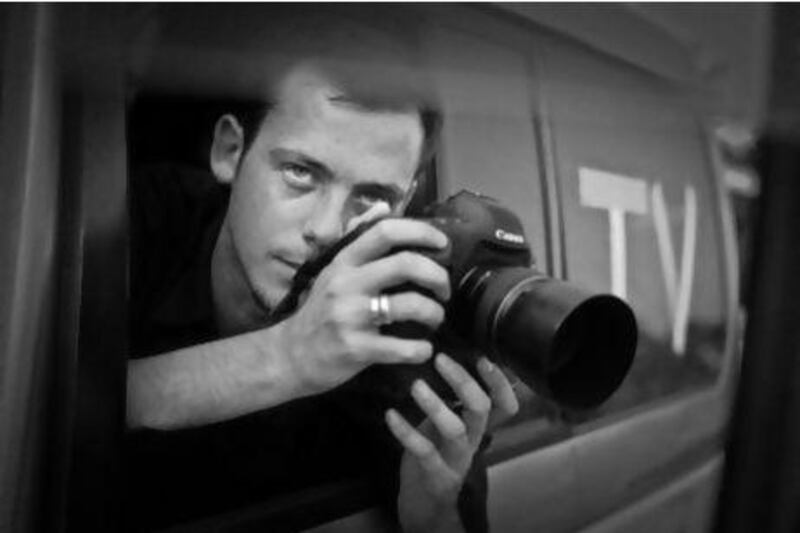MARSEILLE // Rémi Ochlik is just one of thousands of non-combatants to have died in the Syrian civil war, but a poem written, posted online and broadcast by his girlfriend has become a powerful symbol of love and loss.
Ochlik, 28, an award-winning French photographer, was killed along with Marie Colvin, a US veteran of war reporting, during the bombardment of Homs in February last year.
The deaths were widely attributed to an attack by the Syrian army on a building used as a makeshift media centre, but the government blamed rebels.
In her Love Letter to Rémi Ochlik, Emilie Blachère develops a tribute she first paid at a commemoration in Paris two weeks after her boyfriend died.
After the poem was posted online to mark the first anniversary of his death, she was asked by the BBC to read it on air, which she did in excellent though heavily accented English.
The broadcast version begins: "I've never found it so difficult to write. My dictionaries are useless. So instead I made a list of everything I loved about you.
"My angel, [my] love: I loved it when you made lists of things you wanted, and you wanted a Harley Davidson. I loved it when you called me Blachère, or Blacherounette, when you had something you wanted to ask me.
"I loved it when you talked about the arts and painting and literature, and I couldn't understand a thing. You taught me so much. I loved it how in the field you would sink into the shadows, making people forget you were there so you could take better pictures."
Ms Blachère describes inconsequential details of their lives, Ochlik making coffee for her each morning, talking about wanting them to have a boy and a girl and leaving love letters in her notebooks when he fed her cat if she was away.
She expresses admiration for the "courage and rigour" of his work, the professional drive that made him "want to go Libya, Nigeria and Burma [Mayanmar] and then Syria all within five minutes".
Ms Blachère says: "I am so proud of you, my angel … I would have loved to spend my life adding to this list."
Towards the end she deviates from the list format to say: "Our time together was magic. We were prepared for everything except for the worst. In Rome, you told me love is a weakness. You were wrong. Today I feel strong.
"At Christmas, you gave me a notebook and told me 'write down the story of our lives and read it to our kids'. I promise that I will tell the story of the life we dreamed of so often, a life that I am now going to have live for two.
"I am not sure if you miss me, Ochlik, but I miss you madly. But I know that you are here, inside of me, near me, near Earth. Today our nickname Blachlik makes sense."
The presenter of the BBC programme, Paddy O'Connell, was audibly moved and fell silent for several seconds after Ms Blachère had finished before being able to continue.
Ms Blachère, a reporter with the French news magazine Paris-Match, left France to cover the economic crisis in Greece on the day Ochlik called her from Beirut to say he had found a reliable way of returning to Syria.
Another Paris-Match journalist, Alfred de Montesquiou, had been with Ochlik on a hazardous assignment in Zabadani, near Damascus. The magazine told the reporter it was too dangerous to return but, as Montesquiou later wrote, Ochlik had the "freedom of the freelance" and was determined to take "stronger images to show the despair of these people after 11 months of insurrection and merciless repression".
Ms Blachère's poem attracted attention as part of an initiative called A Day Without News, launched on the anniversary of the deaths of her boyfriend and Colvin to highlight the dangers faced by journalists covering conflict.
An international lobby group, the Committee to Protect Journalists, estimates that 971 reporters, photographers and cameramen have been killed since 1992, a figure broken down to include 181 dead in "in crossfire/combat", 122 on "dangerous assignments" and 665 murdered in connection with various areas of journalism.
Ms Blanchère said in a message supporting A Day Without News: "It's really important to show the world not as we imagine it but the world as it is: beautiful, amazing but so, so vicious. And photographers and journalists do this every day, every hour. Some of them die for this. We have to make the general public sensitive to the importance of the press … we want reporters to go everywhere, and especially we need them to come back safe and sound to continue their work."
* Love Letter to Ochlik can he heard at audioboo.fm/boos/1243818-love-letter-to-my-lost-boyfriend#t=0m0s
foreign.desk@thenational.ae






